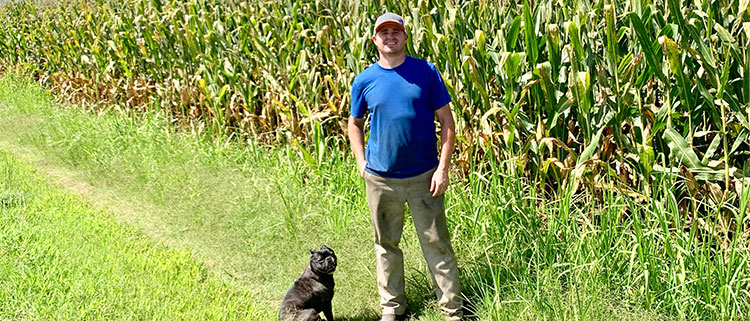“The noise isn’t so bad from inside,” Jesse Todd said recently as he stepped off a combine on a farm in the southern part of the city of Chesapeake. He said this as a jet piloted by a U.S. Navy pilot flew just overhead on a flight path that would take it to the nearby Fentress Naval Auxiliary Landing Field, which is also located in the city of Chesapeake.
There are about 60,000 acres in crop production in the city of Chesapeake, and Todd farms about 2,400 acres here and in southern Virginia Beach, and across the state line in Currituck County, NC. “It’s important to always keep an eye toward the long-term, and the key to that is healthy soil and productivity,” he said.
Long before he farmed by himself, his father discovered great value in using biosolids produced by the Hampton Roads Sanitation District. “I can remember talking with him about using it, and then, when I took over, I did some research about its safety, challenges and benefits.
“I elected to stay in (HRSD’s) program after looking at it and talking to some other farmers. I’ve found biosolids improve my soil, and that it works better on some crops – like corn – than others,” Todd said. He grows corn, soybeans and wheat, and about half what he does is no-till farming, and his goal is to increase that percentage. No-till farming is a way of growing crops without disturbing the soil through tillage.
“I believe that using biosolids is the right thing to do. It provides a great source of natural nutrients – I consider its use ‘green’ recycling. I know some people might not think that way,” he said, noting that some people are concerned about the odor.
What he has learned, like many other farmers, is that biosolids increases productivity and the health of his soil, and reduces the overall cost of fertilizer, which he said is essential in the coastal soils of eastern Virginia.
“When I look at the horizon of farming and where we are today, the key will be to reduce the cost of farming, while figuring ways to make sure my soil is productive,” Todd said. That means he, and other young farmers, are looking at every available program, including programs that incentivize the use of cover crops, another way to obtain nutrients, or local ones like HRSD’s biosolids recycling program.
“We need all of these programs. Farmers in the U.S. provide crops to the world, and I’d like to think our role in world agriculture will continue,” he said.
